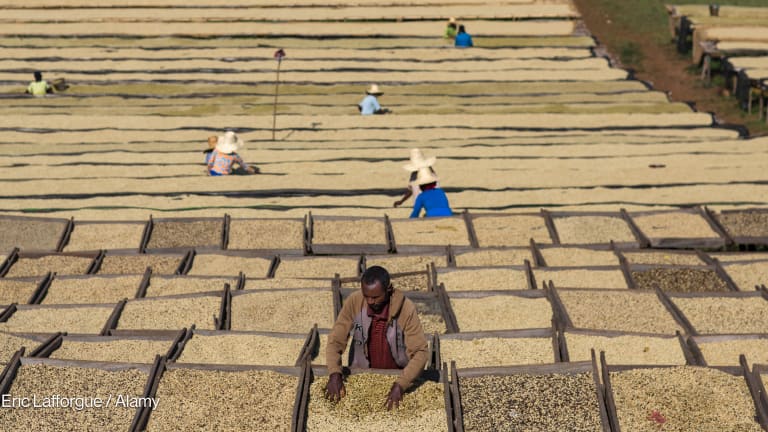Inside BII’s strategy to unlock private capital in Africa’s fragile markets
DFIs are under pressure to deliver in fragile markets. BII’s Chris Chijiutomi explains how they’re doing it — from upstream reform to patient capital and local partnerships.
As traditional donors scale back, the pressure is mounting on development finance institutions, or DFIs, to deliver more — especially in places where capital is scarcest. That makes this a “pivotal moment” for global development finance, according to Chris Chijiutomi, managing director and head of Africa at development finance institution British International Investment, who spoke at a recent Devex Pro event. With over two decades of infrastructure investment experience across Europe and Africa, Chijiutomi now leads BII’s operations on the continent, overseeing investments from renewables and transport to financial inclusion and digital infrastructure. The conversation — part of our Road to Sevilla series ahead of the Fourth International Conference on Financing for Development — explored what it takes to unlock private capital in fragile markets, how DFIs partner with donors and local actors, and what BII sees as the next frontier. A shrinking aid role, a growing DFI mandate Chijiutomi emphasized the amount of capital that could potentially be withdrawn as a consequence of the U.S. aid industry restructuring and European budgets shifting toward defense spending. DFIs such as BII, he argued, must play a catalytic role to keep capital flowing into the world’s most vulnerable economies — particularly where traditional aid is retreating. “A key part of our mandate is to make sure we’re not leaving countries behind,” he said. “The strategy around frontier markets or frontier countries is very important for us.” Redefining fragility — and where to invest Chijiutomi doesn’t use the term “fragile states” lightly — or often. At BII, the preferred framing is “frontier markets,” which shifts the conversation from political instability to systemic underinvestment. Rather than applying a rigid definition, BII has chosen to focus on where the development needs — and investment gaps — are most acute. One of its main tools is the Africa Resilience Investment Accelerator, ARIA — a platform it launched with Dutch DFI FMO and French DFI Proparco to pool resources and align strategy in countries such as Liberia, Sierra Leone, Benin, the Democratic Republic of Congo, and Ethiopia. What these countries have in common, Chijiutomi explained, is a lack of capital and persistent underdevelopment across infrastructure, financial services, and institutional capacity. The mobilization model isn’t what you think Mobilizing private finance is a central goal of development finance. But Chijiutomi was clear: In fragile markets, no one should expect commercial investors to go first. For BII, investing in these contexts is not just about writing checks — it’s about building the system that makes investment possible. That could be “just even something as simple as organizing for missions and visits to these markets for people actually to see and understand what's going on,” Chijiutomi said. BII’s work starts far upstream: mapping the ecosystem, understanding where donors are already engaged, and identifying barriers — from regulation and policy to capacity and deal flow. Through ARIA, BII and its partners have embedded staff in target countries to build relationships, support local reforms, and prepare firms for investment, from improving governance to strengthening financial reporting. One example: In Ethiopia, BII worked with the central bank to revise outdated financial regulations, unlocking investment in a local bank and enabling new credit lines for agriexporters. In parallel, BII offers technical assistance to help companies meet the standards needed to attract capital. That work, Chijiutomi said, is often what makes mobilization possible. Rather than viewing mobilization as a single milestone, BII sees it as a process: DFIs go in first, absorb risk, and demonstrate viability. Only then — and often only gradually — do private investors follow. NGOs and local players can help build pipelines In this model of DFI engagement, traditional development players haven’t become obsolete. For NGOs and implementers wondering how to partner with DFIs, Chijiutomi was clear: “The first thing is to understand what BII’s sector focuses are, and the countries we invest in, because that obviously then enables organizations to see where there’s an alignment in what they’re doing.” In this line, one of the strongest themes of the conversation was the importance of partnerships. BII works closely with FCDO’s country offices to align with local priorities and leverage technical programs. BII has also collaborated with philanthropic groups such as The Rockefeller Foundation on energy access initiatives. Chijiutomi stressed that local knowledge and upstream support are critical — and that NGOs, implementers, and donors still have a central role. Their work, he said, often lays the groundwork for private investment, particularly when it comes to regulation, governance, and early-stage business support. Flexible capital, not flashy structures When it comes to financing models, Chijiutomi made one thing clear: There’s no one-size-fits-all. BII tailors its approach depending on what a particular market or business needs — using a mix of debt, ownership-based investment such as equity, and permanent capital vehicles, which are investment structures designed to operate without a set end date, similar to a permanent endowment or pension fund. BII has invested in permanent capital vehicles, such as a small and medium enterprise finance platform in Ghana. Unlike traditional funds that eventually have to close and return money to investors, these vehicles can stay invested indefinitely, which can be a better fit for slower-growing or higher-risk markets. How BII invests depends on whether businesses need short-term capital or long-term investment. While BII is known for putting up equity capital — often the riskiest but most flexible type — it has increasingly deployed debt and credit facilities in places where businesses are not yet ready to give up ownership or need help managing cash flow. The key lesson? Don’t chase structure — focus on fit. Flexibility is what unlocks real impact. Looking ahead: More African capital, mobilization, pragmatism With 18 months left in its current strategy period, BII is already thinking about what comes next. Chijiutomi suggested that future priorities could include a greater focus on mobilizing African capital — in other words, finding ways to bring more local investors and institutions into the development finance space. He also pointed to a need for deeper collaboration with donors and philanthropic foundations to help absorb early-stage risk and make fragile markets more investable. The bottom line? In fragile markets, investing is never just financial — it’s fundamentally political, institutional, and human. And for DFIs to succeed, they need to start where markets don’t — and build from there. Don't miss out on future briefings. Browse our events calendar for our next live conversations.
As traditional donors scale back, the pressure is mounting on development finance institutions, or DFIs, to deliver more — especially in places where capital is scarcest.
That makes this a “pivotal moment” for global development finance, according to Chris Chijiutomi, managing director and head of Africa at development finance institution British International Investment, who spoke at a recent Devex Pro event.
With over two decades of infrastructure investment experience across Europe and Africa, Chijiutomi now leads BII’s operations on the continent, overseeing investments from renewables and transport to financial inclusion and digital infrastructure.
This story is forDevex Promembers
Unlock this story now with a 15-day free trial of Devex Pro.
With a Devex Pro subscription you'll get access to deeper analysis and exclusive insights from our reporters and analysts.
Start my free trialRequest a group subscription Printing articles to share with others is a breach of our terms and conditions and copyright policy. Please use the sharing options on the left side of the article. Devex Pro members may share up to 10 articles per month using the Pro share tool ( ).
Raquel Alcega leads the data research and analysis at Devex, providing advice to organizations on the latest funding and programmatic trends that shape the global development space. She also heads up the news business content strategy and designs internal knowledge management processes. Prior to joining Devex’s Barcelona office, she worked in business development in Washington, D.C., and as a researcher in Russia and Mexico.








